Some translation issues
Ilf and Petrov are not well-known among the non-Russian public. This is not
very surprising. Writers come and go and only few writers stay forever. From
their era maybe only Bulgakov has stood the worldwide test of time.
Two things are worth noting though. Firstly, they certainly did survive in
Russia itself and they are regarded as real classics there. Secondly,
in the West they never had the status that Nobel prize winners Solzhenitsyn,
Sholokhov and Pasternak had. It would be very interesting to see
sales figures of works of various Russian writers through the years, but I think
Ilf and Petrov would not have a high position on such a list. They
were not communist enough for the taste of western fellow-travellers, neither were they
politically interesting as dissidents. Their work is light and sometimes
humorous, which makes it harder to be included in the literary canon. I
have been told a few times that non-Russians cannot really understand
'Soviet humour', but I find this rather unconvincing, although maybe these
people meant more or less the same as I do:
The point I want to make here is that their relatively small popularity outside
of Russia is also due, in part, to the difficulties in translating their work.
And this is especially true for their best work, the two novels.
I will now try to pinpoint some of the characteristics of their work which
make translation difficult and I will give some concrete examples. When discussing
the examples I will sometimes criticize existing translations. Please note
that in no way I want
to pass a judgement on a translation as a whole, nor on a translator. My comments,
positive or negative, do not extend beyond the discussed examples.
This page is meant to grow slowly but surely. Please feel free to point my
attention to an interesting translation issue or to comment on one of the
issues below. I may include your contribution here.
1. Style in general
2. Wordplay
2a. Геркулес
2b. Долой Хованщину
2c. Голуби говорили "умру", "умру".
2d. слухи о приезде
какой-то с Мечи и Урала подпольной организации
2e. Потеря качества при выигрыше темпа
2f. "Приама нет!"
3. Proper names
4. Пешеходов надо любить.
5. Придется переквалифицироваться в управдомы.
6. Titles
6a. Золотой теленок
6b. Одноэтажная Америка
7. Великий комбинатор
8. Ключ от квартиры, где деньги лежат
1. Style in general
I think Ilf and Petrov are underestimated as stylists. In my opinion their style is
no worse than Bulgakov's and certainly better than that of Solzhenitsyn and Pasternak.
Their work is usually associated with humour and satire, but they could be
magnificently lyrical as well. In their more serious non-fiction work (some of their
Pravda pieces, parts of the America book) they proved that were more than humorists.
Most importantly, they avoided the trite, the commonplace, the easy solutions.
Every sentence was debated amongst the two of them. If Ilf and Petrov each
came op with the same phrase,
they rejected it, because that proved that it was too easy. They were not afraid
of unusual images and metaphores, their style was highly original.
A translator faces a difficult choice. If he or she tries to be true to the
original, the result tends to be somewhat queer. The translator is much more
restricted than the authors themselves, because the authors were loyal only to
their literary conscience, and the translator has to be loyal to the very specific
meaning of the authors as well. If, on the other hand, the translator tries to avoid this
queerness, the result may turn out to be 'too normal', the originality of Ilf and
Petrov's style may well get lost.
See also the Quotes page.
2. Wordplay
Puns are a nightmare for translators. Or a wet dream, depending
on the translator. Even though they are a creative
challenge and can be a lot of fun as a puzzle, the result, the translation of
a pun, is seldom satisfactory.
The works of Ilf and Petrov are not extremely rich in wordplay, I think. But it does
occur and I will give a few
examples, from The Golden Calf (a-c), The Twelve Chairs (d-e) and
Светлая личность (f).
I will be grateful to readers who point
out more specimen.
a. Геркулес. It is easy, especially for a non-Russian, to miss that the last
part of this name, 'лес', refers to what this institution is supposed to do. In the
translations known to me the pun is ignored, the name is simply left
as it is (with an 'H' as it first letter) and the joke is lost.
An ideal translation would be the name of some
mythical hero or deity which contains 'wood' (or the translation of wood in any
target language). In English one might consider 'Woodan', but this is already too
artificial. Moreover, it sounds to English and it refers to a mythology which
is far less-known internationally than the Greek one. Dutch has similar
problems and in fact I think this problem is unsolvable in most languages,
except for perhaps the Slavic ones, where 'wood' is also 'les' or very
similar to it. For those languages, there is in fact no problem at all.
b. Долой Хованщину. First I will give some more context. The phrase occurs
in chapter 19 about the 'universal stamp':
В особенности смущал пункт о латинском алфавите и о поголовном вступлении в
общество "Долой рутину с оперных подмостков". Однако все обернулось мирно.
Скумбриевич, правда, размахнулся и организовал, кроме названного общества,
еще и кружок "Долой Хованщину", но этим все дело и ограничилось.
To understand this pun, the reader must know that Хованщина is an
opera by Musorgski and that the suffix -щина gives a negative connotation,
which makes the phrase sound very plausible as a slogan.
(An example from the period of the novel is 'Маяковщина' and very well-known
is the later notion of 'Ежовщина' - after the name of NKVD boss Nikolay Yezhov -,
to denote the Great Terror of 1936-1938.)
I cannot imagine it possible to really translate the pun, except by explaining
it in a footnote. The Dutch translation by Arie van der Ent does give a
footnote, but only to inform the reader that Хованщина is an
opera by Musorgski. Gurevich and Anderson make a radical decision in
their English translation. They have: 'Down with the Queen of Spades!'
Apparently they think that most readers do not recognize the name
of Musorgski's opera, but that they do know Tchaikovsky's opera. In the first
place I rather doubt whether this is true. It is better known, it is
probably one of the best-known Russian operas, but still... If the translators
wanted to take the name of an opera most readers would recognize, why not take a
really well-known, non-Russian opera like Rigoletto? In their
translation the reader might rather think of Pushkin's story of the
same name. And secondly, the joke with the suffix is also lost. Mrs Fisher
translates it as 'Down With the Khovanshchina!' and explains it in a note. This
is a bit like admitting defeat, but I think there is no satisfactory translation
for this joke. An interesting point in her translation is the use of the definite
article 'the'. This means that she focuses the attention on the understanding
of the word Хованщина as a - non-existing - phenomenon, rather than
the name of the opera. We would never say 'Down with the Rigoletto' or
'Down with the Mazeppa'. But even then: why the article? Wouldn't we also say
'Down with capitalism'?
c. Голуби говорили "умру", "умру". Chapter 34 ends with Bender's
failure to impress the nice students in the train with his money. It is a
complete defeat - he likes the students, he made friends with them, but
seeing his million scares them away and he is left just as lonely as
before. In this already pessimistic mood chapter 35 then begins with a
magnificent but very sombre description
of Chernomorsk street life. The quoted sentence is part of this description.
To
translate the pun the translator should find some gloomy sentence which sounds
like the sound of doves. It does not necessarily have to be about dying.
In the Dutch translation of Arie van der Ent the sentence is translated as
'de duiven koerden "Toedeloe, toedeloe".' In English this would literally
be something like 'the pigeons cooed "bye-bye".' The Dutch 'oe' sounds like
the Russian у and the English 'oo' but I think the pigeon sound also needs the
letter r. So not only is the sentence much less like how pigeons sound than
the Russian one, but the gloominess is lost, because 'toedeloe' is
a light-hearted, gay farewell greeting. Ilf and Petrov's brilliant pun is
completely lost. I could not come up with anything better than
"Hoe droef, hoe droef" ("How
sad, how sad"). It is not perfect, but it better than 'toedeloe', in my
humble opinion.
Gurevich and Anderson have 'Pigeons were saying, "You throoh, you throoh", which
I like very much.
Fisher: 'Pigeons mournfully cooed "I'm through, I'm through."' I am not too
enthousiastic about this one. The word 'mournfully' is not present in the
original text and apparently is meant to clarify the pun. On the other hand,
the use of the first person is closer to the original than the other translation,
but here I think the 'oo' sound of 'you' is more important.
d. Следствием его недомолвок было то, что город наполнили слухи о приезде
какой-то с Мечи и Урала подпольной организации.
The difficult part of course here is 'с Мечи и Урала'.
Dutch translator Arie van der Ent has turned this into 'uit Zwaar en Boekwaard'.
These look like geographical names, but they are not, whereas in Russian they
are a river (Красивая Меча) and a mountain range respectively. As an alternative
I offer 'uit Zwaag en Hoegaarden', respectively a village in North Holland and
a village in the Belgian province of Brabant, home to the famous wheat beer.
Richardson offers a different kind of solution: 'The result of his insinuation
was that rumors began to go around that some sort of underground organization had
arrived from Mech and the Urals with a supply of swords and plowshares'. Leaving
aside the fact that as far as I have been able to establish there is no
geographical unit 'Mech', this solution is too easy in my opinion: was it that
hard to come up with an English equivalent?
e. Потеря качества при выигрыше темпа. I also discuss this one on the
Chess page. The phrase
has a certain Marxist ring to it, but the words 'качество' and 'темп' are chess
idiom as well. 'качество' means the difference in value between a rook and a
knight or bishop. In English this is called 'exchange', which makes the phrase
hard to translate because the ambiguity is lost ('loss of the exchange' has no
meaning outside of chess). The same goes, to a lesser extent for 'выигрыш темп':
the English 'tempo' is not often used in a 'general' context. In chess it is
the 'unit of time'. When you win a tempo, you win time.
English translator John Richardson turned the phrase into
'A Decline in the Standard of
Play with a Gain in Pace', which is just gibberish, both in a chess as in a
'social' sense.
For Dutch the situation is a bit better. The first part, Потеря качества, can
be just translated in a straightforward manner, just as in German. Dutch "kwaliteit"
and German "Qualitaet" have the same double meanings as their Russian counterpart.
The second part gives the same problem, however.
Dutch translator Arie van der Ent has translated it as 'Kwaliteitsverlies bij
Tempowinst'. This is a correct translation of the chess content, but the ideological
connotation of the second part is lost. I would have chosen for 'Kwaliteitsverlies bij
Snelle Ontwikkeling' ('snelle ontwikkeling' means 'quick development'. In a chess
sense this is not quite the same, but it is similar and 'quick development'
has a 'social' meaning as well, just as in English.
f.
Он отчетливо
видел
ахейских
воинов, подступивших к
огромным
воротам Трои и
с удивлением останавливающихся перед белой эмалированной таблицей с надписью: "Приама нет!"
A challenge, but one that offers room for the translator's creativity.
Look at
interesting
explanation
of a pun by English translator Anne Fisher.
3. Proper names
Many of Ilf and Petrov's family and other names (towns, institutions) have
meaningful, often humorous ingredients. This
is not only true for their novels, but also for the short stories. What should
the translator do? Their are several options:
a. Not translate the names.
This is what probably most translators do.
It is the safest option, but it makes the translation a little less colourful
than the original.
b. Really translate the names, trying to find an equivalent in the target
language.
I do not know whether there are Ilf and Petrov translators who have chosen this
radical option. I have seen it in a Dutch Gogol translation (by Arie van der Ent),
though. Strangely,
the translator only translated the family names, not the first
names. In my opinion the result is too queer, but tastes differ. Maybe
some readers without affinity with Russia feel less of a barrier when
the names sound more Dutch.
The same translator did translate some town names in the Ilf and Petrov novels:
Старгород became Oudstad ('Oldtown') Черноморск became Zeestad ('Seatown'). I
could have respected this, if these Dutch names were not so completely colourless,
especially the last one. And the name of Zeestad will not inform the reader
that the town is situated at the
Black Sea, that in fact Odessa is meant.
c. Not translate the names, but provide a list with explanations at the
end of the book.
I rather like this compromise, which was used by Dutch translator Frans Stapert
in De blauwe duivel, a collection of translated Ilf and Petrov stories.
The reader does not need to be bothered by the explanations, if he does not want
to, but he may get a bit closer to the original.
4. Пешеходов надо любить.
The very first sentence of Zolotoy Telyonok (not including its foreword) is
hard to translate. Why? It is a simple sentence, isn't it?
The first English translation by Charles Malamuth, whom Ilf and Petrov met
in America and who also translated their American book, has 'Pedestrians
should be loved'. This is more or less literal, the passive construction
reflects the word order of the Russian sentence. It seems adequate to me, but
no more: it is not as catchy as the original.
In the 2009 translation by Anne Fischer it is quite different: 'Pedestrians
just need to be loved'. Maybe there is something to be said for 'need to'
instead of 'should', but I do not like the 'just' at all. It introduces an
emotional note, which may be present in the original, but only in an implicit way.
The Russian sentence is delightfully laconic and a perfect opening of a novel.
The translation by Mrs. Fischer is too awkward, in my opinion. Gurevich
and Anderson (2009) have 'You have to be nice to pedestrians'. Hm. 'To be nice
to' is not the same as 'to love', is it?
Does anybody know a better solution? Ideas are welcome.
Now let us turn to the Dutch. (Non-Dutch readers, please do not stop reading,
I will give the necessary explanations and translations.)
In Dutch the problem is the word order in combination with the word 'lyubit'.
Normally the most natural choice would be, as in English, a passive construction.
But in Dutch the verb 'love' is 'houden van', where 'van' is a preposition.
This means that a passive construction would be 'Van voetgangers moet worden
gehouden' ('moeten' = 'must', 'voetgangers' = 'pedestrians', 'worden' is the
auxiliary verb for the passive construction),
which is extremely awkward. So a passive construction is out.
Other possibilities would seem to be 'Van voetgangers moet je houden',
'Van voetgangers moet men houden' or 'Van voetgangers moeten we houden' ('je',
'men' and 'we' meaning 'you', ' one' and 'we' respectively), but
they are too artificial as well. The Dutch translator Arie van der Ent chose
another solution: 'Voetgangers verdienen liefde.' In English this would be
'Pedestrians deserve love'. The meaning is practically the same as the original,
but my problem is that, in my opinion, the combination 'verdienen liefde' sounds
too unusual. 'verdienen respect', 'verdienen aandacht' (attention), 'verdienen
bewondering' (admiration), these all sound okay, but 'verdienen liefde' - no.
In English it also sounds a bit awkward, I think. A small variation,
'Voetgangers verdienen onze liefde' ('Pedestrians deserve our love') would
already be better, and this may be the most natural translation, almost
fully retaining the meaning of the original. When we permit ourselves a bit more
freedom, I think 'Voetgangers verdienen respect' is an interesting option,
especially since the word 'respect' has acquired a broader meaning nowadays,
not only referring to 'respect' but also to 'admiration', particularly in
connection with popular culture. Still farther away from the original meaning
is 'Voetgangers zijn helden' ('Pedestrians are heroes'), which I rather like,
but would hesitate to use were I in the happy position to translate this novel.
5. Придется переквалифицироваться в управдомы.
The final chord of the novel is just as catchy and musical as the opening sentence.
Dutch translator Van der Ent: 'Ik laat me omscholen tot huisbaas.'
This sounds well. However, The word
'Придется' has been left out, as if the Russian would have been
'Переквалифицируюсь в управдомы.' More literal would have been 'Ik zal me moeten
laten omscholen...' or 'Ik moet me laten omscholen...' I can understand the
translator's choice here, though. The first of these alternatives sounds a bit
awkward because of the many auxiliaries, and the second also is not quite right,
because it sounds much too 'definite'. And the
difference in meaning is not so great. More serious is the word 'huisbaas',
which means 'owner of
a house' and is quite simply wrong, whereas Dutch has the perfect translation
'huismeester' here. My choice for this sentence would have been
'Ik moet me maar laten omscholen tot huismeester'. In the first part, I think
the word 'maar' (which I cannot explain to non-Dutch readers) gives just the
right emotional touch.
Anne Fisher: 'I'll have to get re-trained as an apartment building supervisor.'
This is an exact representation of the original content, but really... I suppose
an English or American 'concierge' is not exactly the same as an 'управдом' (he
is less powerful), but
is the difference so great that this colourless, awkward three-word translation is
necessary? This is the final sentence of Ilf and Petrov's finest novel! How
can you do this to the reader?
Gurevich and Anderson: 'I'll have to go into apartment management instead.' This
sounds a little, but not much, better dan Mrs Fisher's translation, but the
meaning is much vaguer. Apartment management? Of the two English translations,
I still prefer the one of Mrs Fisher, even though I do not like that one at all.
6. Titles
6a. Золотой теленок
The very first translation of the title of this novel was
'The Little Golden Calf'. This is accurate, of course. However, there have also
been editions titled 'The Golden Calf'. One can understand this: 'The Little
Golden Calf' does not sound very well. And English does not have a
diminutive particle (the -енок in Russian here). At least, not one that can be
appended to 'calf'.
So it is a choice between accuracy and
euphony. Both choices can be defended. Personally I would opt for accuracy in this
case, as Ms Fisher did in her recent translation.
BUT! Strangely, in languages which do have a diminutive particle, the title is
still translated as 'The golden calf'.
Dutch: Het gouden kalf
German: Das goldene Kalb
Italian: Il vitello d'oro
Whereas correct would have been:
Dutch: Het gouden kalfje
German: Das goldene Kälbchen
Italian: Il vitellino d'oro
This I cannot understand. It is not for nothing that Ilf and Petrov used
теленок instead of телец. In the biblical context the word is 'телец'
(here
is, in English, the relevant part of the biblical book of Exodus, and
here
you can find more information in Russian) and they chose
the diminutive form 'теленок' for a reason. It is not difficult to imagine which reason,
but that is not even relevant here. This choice of the authors should be
respected if possible. And in the languages I mentioned it is very
much possible.
6b. Одноэтажная Америка
This book title presents problems as well.
The first, authorized translation in English went under the title
Little Golden America. Neither the translator nor the authors were happy
about this. The reason for the title is obvious though: the publisher wanted to draw the
attention of the reading to the public that the authors were the same as those
of The Little Golden Calf.
Leaving this aspect aside, it is a strange title, of course, though not
completely nonsensical: 'Little'
reflects the Одноэтажная part, and 'Golden' could refer to California, the
Golden state, which plays a large part in the book. The title has been
retained in later translations; Ilf and Petrov's American Road Trip is a
translation not of the book but of the original series in Ogonyok.
In English One-storied America would seem to be adequate, but to me it seems
somewhat stranger than the original. (English native speakers,
what do you think?)
I had the honour of translating this book into Dutch. As for the title,
a direct translation is impossible, as there exists no appropriate adjective.
In Dutch 'one-storied house' would be 'een huis van een verdieping', i.e. 'a house of one storey'.
When the time had come to discuss the title with the publisher I suggested a
few titles, neither of which entirely satisfied me. My favourite was
Amerika onder de wolkenkrabbers, literally 'America beneath the
skycrapers'. However, the publisher chose Amerika eenhoog, a title
which Arie van der Ent, the translator of the two 'main' novels, had used in his
Afterword to this edition, which had been published by the same publishing
company. At first I did not like it at all. Literally it means 'America one storey high',
but 'eenhoog' in fact refers to the first floor in the British sense, i.e. the
second storey in the American (and Russian) usage. Seen in this way, the title
makes no sense at all. However, I resigned myself to it, realising that few
readers will read it that way. The title is a bit vague, but also vaguely
interesting and euphonous.
7. Великий комбинатор
Now this one is also a challenge.
We all know what it means, don't we? But do we? Well, vaguely.
What does it mean?
Obviously it is something like a manipulator, someone who thinks up all kind
of tricks to reach a certain goal. Something like that, anyway.
In Charles Malamuth's first translation Bender is called 'the great schemer'.
This seems accurate, though I am not sure whether the connotations are the
same as in Russian. In December 2009 two new English translations appeared,
one (The Little Golden Calf) translated by Anne O. Fisher, the other
(The Golden Calf) translated by Konstantin Gurevich and Helen Anderson.
Gurevich and Anderson translate the phrase by 'grand strategist'. I do not
like that solution, though I find it hard to explain why. I think Bender's 'combinations'
together contribute to his overall strategy. They are on a different
level. In chess terms, a player who is good at combinations is called a
tactician, and a player who tends to think more on the long term is a
strategist. (See the chess page for some information
about the Great Combinator of chess.)
In the translation by Ms. Fisher Великий комбинатор has been translated by
'smooth operator', just as in John H.C. Richardson's translation of 1961.
This might seem strange to a non-English reader (it did to me, at first),
but look at the description in the online
Urban Dictionary,
a real treasure of colloquial English:
Someone who can handle multiple situations in a fashion that can only be
described as "Awesome, spectucular, and, above all else, awesometacular".
Usually a smooth operator is someone who tends to be "on top of things",
and in is usually in control of any given situation. If he/she isn't in
control of a situation, they usually find a way to gain control of it to make
it more awesome for everyone involved. Smooth Operators are rarely in trouble,
and, when they are, they can usually get out of these situations quickly,
elegantly and with a zero percent chance of casualties.
Isn't this a perfect description of Ostap Bender?
In Dutch the situation is more difficult. Honselaar's dictionary (Pegasus, 2002)
gives комбинатор = gewiekst/gehaaid iemand ('cunning/smart person') and
Великий комбинатор = iemand die goed is in manipuleren ('someone good at
manipulating'). Both are descriptions rather than direct translations, in any
case they are not directly usable. Google Translate gives комбинатор = intrigant.
This is interesting, because according to the dictionary 'intrigant' is a Dutch
equivalent of 'schemer'. Unfortunately, it is a word with only negative
connotations: a person who creates discord among others, who intrigues. So 'de
grote intrigant' is definitely out. Another possibility would be 'de grote
manipuleerder' ('the great manipulator') but that also sounds vaguely negative.
I toyed with the idea of 'de grote breinbaas' ('the great brain boss'),
referring to a character in the works of Marten Toonder, a Dutch writer who
shares some characteristics with Ilf and Petrov (humour, satire, great sense of
language and style, introduced many words and phrases into the Dutch language,
not taken quite seriously as literator), but that would be too whimsical. So
what did Dutch translators do? Frans Stapert used 'de grote combinator',
essentially introducing a Dutch word, for 'combinator' is not in the dictionary.
This has as an advantage that the reader can attach any meaning to it, in this
case simply 'someone like Ostap Bender'. But for the same reason it is not
entirely satisfactory. Arie van der Ent made the radical choice of
'groot-combinateur', which does not exist either and is a lot stranger than the
original. The
idea behind this is the association with 'groot-inquisiteur', in Russian
великий инквизитор. This association may also be present in Russian, but
certainly not as strong as in Dutch. Van der Ent's point is that,
as he writes in his
aftwerword to the translation, Bender plays the role of great-inquisitor by
fighting against the evil Soviet society. A view which is rather dubious, in my opinion, and
I think it is not the translator's task to steer the reader's thoughts in a
specific direction in this manner.
In short, I think that so far there is no satisfactory translation of
Великий комбинатор in Dutch.
8. Ключ от квартиры, где деньги лежат
This phrase was the basis for the character of Ostap Bender. Its translation is
therefore important. It is one of the most frequently cited phrases of
The Twelve Chairs.
Why? Because it is so funny? Only partly so. I think it is the musicality,
the rhythm which plays an important part. In Russian it is a perfect dactyl:
Ключ от квартиры, где деньги лежат
(Here is an
explanation in Wikipedia of what a dactyl is.)
I believe that something of this should be preserved in the translation, although it does not
necessarily have to be a dactyl.
John Richardson: 'the key to the apartment where the
money is', i.e. a literal translation which does not do any justice to the
metre, the rhythm. Indeed, what is so special about this?, the English reader
might think.
Let's turn to Dutch.
Frans Stapert:
'De sleutel van de woning, waar het geld ligt.' Completely literal, including
the comma, which is incorrect here in Dutch, as would be a comma after
'apartment' in the English translation.
Arie van der Ent: 'De sleutel van de woning waar het geld ligt.' Here the
comma use is correct. Its rhythm is better than in English: you could even
read it as a
trochee with
an extra unstressed syllable at the beginning:
De sleutel van de woning waar het geld ligt.
Still, it sounds somewhat flat and uninteresting. I think the reason for this is the word 'woning',
which is the direct translation of квартира, but it is much more formal. It is
used in official texts, in commercial texts, in newspapers, but hardly ever in
everyday speech. It is out of context here. An idiomatic translation would be:
'De sleutel van het huis waar het geld ligt.'
'Huis' is the Dutch word for 'house' and the Russian 'дом', but the usage is
more general, especially more general than the usage of 'дом'.
This new translation, unfortunately, has no metre. Another try is a less
literal but more euphonous translation:
'De sleutels van de voordeur en de kluis.'
Literally this means 'The keys of the front door and the safe.' It can also be read
as a trochee with an extra unstressed syllable at the beginning: De sleutels
van de voordeur en de kluis.
It may be a somewhat daring translation, but I think this would be the one I would
choose.
There is another very important aspect involved here. In Russia this phrase
has become 'winged': many, many people know it, even if they may not always know
the origin. It has become part of a collective knowledge. When you use it in a
conversation, the listener will probably smile. One can use it in written texts
and the readers will recognize it. The same holds of course for other phrases,
like 'командовать парадом буду я', 'лед тронулся', 'заседание продолжается'
and so on. This aspect of 'collectiveness' cannot be translated. These phrases
can never attain such widespread useage in the target language. Therefore
the translation of these well-known phrases will always seem somewhat paler than
the original.
It should be noted that this problem plays a much smaller role in the
translation of the 'other' works of the co-authors, by which I mean everything
but the two novels. These are much less known in Russia. With some exaggeration
I might say that I never met a Russian who has not read The Twelve Chairs and
The Little Golden Calf, nor a
Russian who did read any of their other works. The other works contain
almost no winged phrases.
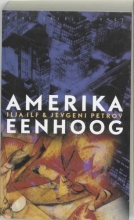
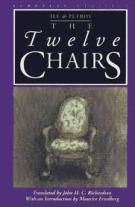
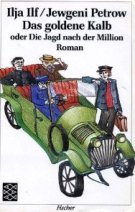
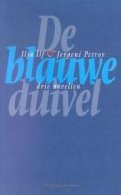
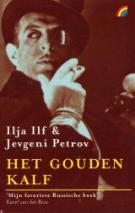
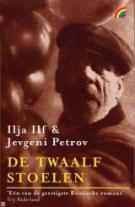
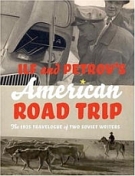
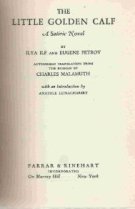
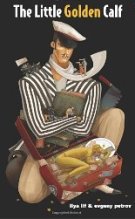
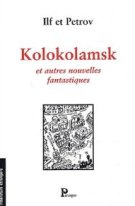
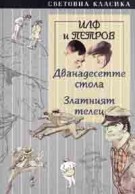
Document history of this page:
First online - 18/11/2010
Last minor changes - 12/01/2011
Last major changes - 9/12/2010 (several minor additions, point 5 about last sentence of Little Golden Calf added)